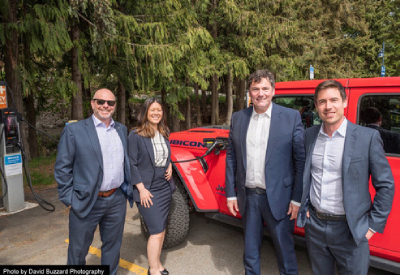Canada and B.C. invest in 14 CleanBC Infrastructure Projects Across the Province

June 17, 2022
Investments in green infrastructure projects help build sustainable, resilient communities. They create adaptive solutions to tackle climate change and mitigate its impacts—such as the wildfires and floods experienced in British Columbia this past year—and they support the shift to a cleaner economy that will help communities prosper.
Yesterday, the Honourable Dominic LeBlanc, Minister of Intergovernmental Affairs, Infrastructure and Communities, and the Honourable Bowinn Ma, British Columbia’s Minister of State for Infrastructure acting for the Honourable George Heyman, B.C. Minister of Environment and Climate Change Strategy, announced more than $32.8 million in joint federal-provincial funding for 14 green infrastructure projects in B.C.
Among these projects, the Resort Municipality of Whistler will benefit from an expansion of the Sea-to-Sky Electric Vehicle Charging Network, including the installation of 41 new electric vehicle charging stations and upgrades to the electric grid to support future demand. Thirteen of the new stations will be direct-current fast-charging stations capable of charging a battery from empty to 80% in 30-60 minutes depending on vehicle battery size.
The investment will also help improve housing options for vulnerable seniors with upgrades to the building envelope, ventilation system, space, and water heating for 26 supported housing units in Victoria, in partnership with Pacifica Housing. The project will decarbonize the building and improve comfort in extreme weather events like heat waves and wildfires.
In addition, some of the funding will support the partnership between the Skidegate Band Council, the Old Massett Village Council, and the Council of Haida Nations to construct a new solar energy farm. The solar photovoltaic farm will be built and operated jointly by the partnership members to generate clean energy, which will displace fossil fuel use on Haida Gwaii’s northern isolated grid.
Other CleanBC projects announced yesterday include a hydropower station and the installation of heat recovery systems to produce renewable natural gas.
The Government of Canada is investing more than $18.5 million and the Government of British Columbia is contributing over $14.3 million in these 14 projects through the second intake of the CleanBC Communities Fund, under the Green Infrastructure Stream of the Investing in Canada Infrastructure Program. Contributions from municipal, First Nation and not-for-profit recipients total more than $10.9 million.
Project Information
|
Recipients |
Project Name |
Project Details |
Federal Funding |
Provincial Funding |
First Nation / Municipal / Other Funding |
|
Abbotsford |
Biogas Upgrading Technology at JAMES Plant |
Add biogas upgrading equipment to the JAMES Wastewater Treatment Plant, establish an on-site renewable gas connection for an external gas pipeline, and perform related works |
$1,287,000 |
$3,431,785 |
$1,716,215 |
|
Haida Gwaii |
Skidegate Band Council TLL Yahda Energy Solar Farm |
Build a solar panel farm with battery storage, and perform associated electrical and site work |
$3,039,485 |
$0 |
$1,013,162 |
|
Huu-ay-aht First Nations |
Sarita River Hydro* |
Build a grid-connected hydropower station with approximately 5.4 MW capacity and related infrastructureto provide energy security for the Huu-ay-aht First Nation and neighbouring communities on the west coast of central Vancouver Island |
$3,916,666 |
$783,333 |
$522,223 |
|
Metro Vancouver |
Wastewater Treatment Plant Heat Recovery |
Install renewable energy producing equipment at the Lulu Island Wastewater Treatment Plant, including a heat recovery system and wastewater infrastructure |
$2,141,552 |
$1,784,448 |
$1,427,880 |
|
Nanaimo |
French Creek Pollution Control Centre Heat Recovery and Solar Energy |
Upgrade wastewater and heating, ventilation and air conditioning infrastructure, and install solar panels and heat recovery equipment |
$400,007 |
$333,305 |
$266,706 |
|
Nelson |
Civic Centre Low-Carbon Heritage Renewal |
Upgrade the roof, walls, windows, and doors, and install new energy-recovery ventilators and a heat-recovery chiller |
$1,058,844 |
$2,823,408 |
$1,411,969 |
|
Penelakut Island First Nation |
Solar Resilience Initiative |
Install solar panel arrays, and establish back-up power for the community centre through battery banks |
$184,828 |
$0 |
$61,610 |
|
Penticton |
Electric Vehicle Rapid Charging Infrastructure** |
Install four direct-current-fast-charging stations for vehicles and perform electric upgrades to support charging demand to expand electric vehicle charging network |
$134,761 |
$112,290 |
$89,853 |
|
Powell River |
Recreation Complex Ice Plant Heat Recovery |
Add a heat recovery system to the ice plant, utilizing space and pool heating systems. |
$846,589 |
$705,420 |
$564,465 |
|
Prince George |
Kin Centre Arenas Refrigeration & Energy Recovery Upgrades |
Add a heat recovery system to the ammonia refrigeration plant, and upgrade the heating, ventilation, and air conditioning systems |
$1,778,000 |
$1,481,518 |
$1,185,482 |
|
Saanich |
G.R. Pearkes Recreation Centre Heat Recovery & Mechanical Upgrade |
Upgrade and install new heating, ventilation, and air conditioning components, including heat recovery mechanisms |
$1,574,099 |
$1,311,618 |
$1,049,531 |
|
Victoria |
Oaklands Community Centre: HVAC & Control System Replacement |
Install new heat recovery ventilator and heat pumps, replace electric heaters, and upgrade the building control system |
$94,025 |
$78,346 |
$62,692 |
|
Pacifica Housing Advisory Association |
Retrofits for Low-Income Housing |
Upgrade the building envelope, ventilation system, space heating, and domestic water heating for 26 affordable/social housing units |
$867,692 |
$542,307 |
$759,232 |
|
Whistler |
Sea to Sky Electric Vehicle Network Expansion |
Expand the existing Sea-to-Sky Electric Vehicle Charging Network by adding approximately 28 dual-port Level-2 and 13 direct-current fast-charging stations and making necessary upgrades to the electrical grid to handle future charging demand |
$1,190,296 |
$991,814 |
$793,632 |
*Federal funding is conditional on fulfilling all related requirements.
**Federal funding is conditional on fulfilling all requirements related to consultation with Indigenous groups.











![Guide to the Canadian Electrical Code, Part 1[i], 26th Edition– A Road Map: Section 56](https://electricalindustry.ca/wp-content/uploads/2022/11/Guide-CE-Code-2.png)



